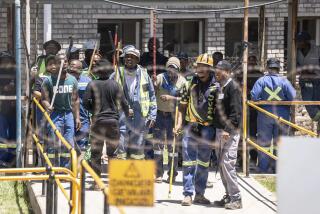Coal Miners Demand That Gorbachev Resign : Soviet Union: The countrywide strike will continue until President is gone, one walkout leader says. Prime minister calls demands unreasonable.
- Share via
MOSCOW — A spreading Soviet coal miners’ strike that stretches from the Ukraine to western Siberia will continue until Soviet President Mikhail S. Gorbachev resigns, a leader of one of the largest strike committees said Wednesday.
“Under Gorbachev’s leadership, we’re living our lives by ration coupons,” said Yuri V. Komarev, co-chairman of the strike committee in the western Siberian city of Novokuznetsk, the center of the country’s second largest coal area. “We will stay on strike until Gorbachev and his team resign.”
The strike began late last week in the Ukraine and the Central Asian republic of Kazakhstan and, on Monday, spread to mines in western Siberia.
In the Ukraine, the mines on strike have increased to 21, according to Andrei O. Slivka, a member of the strike committee in Donetsk, the heart of the largest Soviet coal field. At 11 more mines in the Donetsk Basin, miners are still at work but they are refusing to ship the coal, he added.
In western Siberian coal fields, four mines are on strike, idling 70,000 workers, and five others are refusing to ship their coal. Workers at 28 mines, more than a third of those in the coal-rich region, held a 24-hour warning strike, according to Komarev.
Slivka said many more mines would like to participate in the strike but that management at those enterprises has threatened to fine strikers 200 rubles a day, or half an average month’s pay. Local officials have warned that “agitators” will be prosecuted and jailed.
But many miners apparently would not be deterred.
“No fewer than 100,000 miners are striking right now,” Slivka said in a telephone interview. “This strike should show Gorbachev that, when his government makes pledges, he should be responsible for them.”
The miners in the Ukraine are calling for wage increases of up to 150% and for the right to retire after working 25 years underground. They said the government promised to meet both those demands in order to get the miners back on the job in the summer of 1989, when more than 500,000 miners across the country struck for two weeks.
Although the current strikes do not approach the 1989 crisis in scale, they are weakening not only the Soviet energy industry but other sectors of the economy, including steel production, that depend on it, and the Kremlin is clearly worried about the overall impact.
Prime Minister Valentin S. Pavlov, speaking on Soviet television Tuesday, appealed to miners to return to work and called their demands unreasonable at a time when industrial production across the country is plummeting.
“I would like to raise everyone’s pay tomorrow as high as the miners wish,” Pavlov said during an interview on “Vremya,” the evening news program. “There’s only one question: Where will we get the money?”
Pavlov said the country’s production has dropped 5% since the beginning of the year and that the miners’ productivity has declined over the last three years.
“I want the miners to understand that they have no enemies in the government,” the prime minister continued. “But we have to look objectively and realistically at what we can do and when we can do it.”
The demands of the strike vary from mine to mine. Although some mines had only economic demands, the Bolshevik Mine in Novokuznetsk demanded that a question of no confidence in Gorbachev be added to the countrywide March 17 referendum on preserving the Soviet Union as a federal state.
Many miners said they support Russian Federation President Boris N. Yeltsin, who has emerged as Gorbachev’s chief rival. “We support Yeltsin . . . not because of his nice name but because of his concrete deeds and his policies,” Komarev said.
The strike has also reached into southern Russia, where 18 of the 101 mines in the Rostov-on-the-Don region were on strike, the labor newspaper Trud said.
More to Read
Sign up for Essential California
The most important California stories and recommendations in your inbox every morning.
You may occasionally receive promotional content from the Los Angeles Times.













